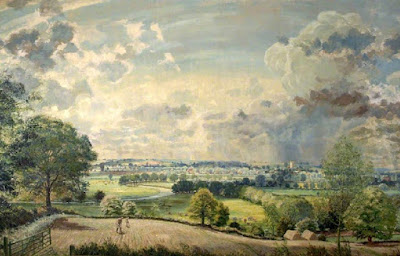As the moment unfolded, I knew that it was perfect. At the same instant, I felt a sudden awareness of the passing of time. This awareness came in the form of a catch of breath. It was immediately followed by a longing, a longing for I knew not what. The wind buffeted in my ears. I continued walking.
That was long ago, and I was young. But the autumn morning on Skye was not my first encounter with this peculiar sort of longing, nor was it the last.
The moment returned to me this week after I read this:
I am in Kyoto,
Yet at the voice of the hototogisu,
Longing for Kyoto.
Bashō (translated by R. H. Blyth), in R. H. Blyth, Haiku, Volume 3: Summer-Autumn (Hokuseido Press 1952), page 175.
"The hototogisu corresponds more or less to the English cuckoo. The breast of the male is blackish, with white blotches. The breast of the female is white, the inside of the mouth red; it has a crest of hair on the head. . . . From early summer, it sings day and night, and ceases in autumn."
Ibid, page 161.
John Nash (1893-1977), "Dorset Landscape" (1930)
Here is an alternative translation:
Even in Kyoto --
hearing the cuckoo's cry --
I long for Kyoto.
Bashō (translated by Robert Hass), in Robert Hass (editor), The Essential Haiku: Versions of Bashō, Buson, and Issa (The Ecco Press 1994), page 11.
The original Japanese is simple (on the surface):
kyō nite mo
kyō natsukashi ya
hototogisu
Kyō is an earlier name for Kyoto; nite is "in;" mo is "even;" natsukashi is "long-for;" ya is a particle of emphasis (similar to "!" in English, but less emphatic; there is a softer aesthetic element to it); hototogisu is "cuckoo." Note that there is no reference to the cuckoo's "voice" or "cry": those are interpolations made by Blyth and Hass.
The following translation perhaps captures best the deep simplicity of the original:
even in Kyoto
I long for Kyoto --
a hototogisu
Bashō (translated by Makoto Ueda), in Makoto Ueda, Bashō and His Interpreters: Selected Hokku with Commentary (Stanford University Press 1991), page 294.
John Nash, "The Barn, Wormingford" (1954)
The standard interpretation of Bashō's haiku is that the Kyoto that is longed for is the old, vanished Kyoto. Thus, Blyth writes: "Bashō is at this moment living in Kyoto, but at the sound of the voice of the hototogisu a wave of yearning flows over him for the past, the Kyoto of dead and gone poets of old." Blyth, Haiku, Volume 3: Summer-Autumn, page 175.
Perhaps. But I wonder if the "longing" of which Bashō writes is the sort of longing that I experienced for a moment on the Isle of Skye. A Japanese commenter on the haiku articulates what I am trying to get at: "Somehow we tend to feel nostalgic in early summer, when hototogisu cry. At times we get homesick, too, while in our own home." Nunami Keion (1877-1927) (translated by Makoto Ueda), in Ueda, Bashō and His Interpreters: Selected Hokku with Commentary, page 294.
"At times we get homesick, too, while in our own home." Exactly.
Nostalgia for the Present
At that very instant:
Oh, what I would not give for the joy
of being at your side in Iceland
inside the great unmoving daytime
and of sharing this now
the way one shares music
or the taste of fruit.
At that very instant
the man was at her side in Iceland.
Jorge Luis Borges (translated by Alan Trueblood), in Jorge Luis Borges, Selected Poems (edited by Alexander Coleman) (Viking 1999).
Borges's phrase hits the nail on the head: "Nostalgia for the Present."
A longing for the present in the present. Which makes no sense, of course. But it happens.
John Nash, "A Gloucestershire Landscape" (1914)
There is a dreamlike quality to this experience. But, at the same time, the present moment -- and everything that surrounds you at that moment -- is crystal clear and luminous. You will never be more wide awake.
Abersoch
There was that headland, asleep on the sea,
The air full of thunder and the far air
Brittle with lightning; there was that girl
Riding her cycle, hair at half-mast,
And the men smoking, the dinghies at rest
On the calm tide. There were people going
About their business, while the storm grew
Louder and nearer and did not break.
Why do I remember these few things,
That were rumours of life, not life itself
That was being lived fiercely, where the storm raged?
Was it just that the girl smiled,
Though not at me, and the men smoking
Had the look of those who have come safely home?
R. S. Thomas, Tares (Rupert Hart-Davis 1961).
John Nash, "Mill Building, Boxted" (1962)























